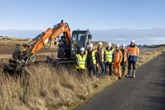RWE pioneers cargo drone operations at offshore wind farms
Published by Jessica Casey,
Editor
Energy Global,
For the first time in German offshore airspace, RWE has pioneered long-range autonomous and short-distance cargo drones in the daily operations of offshore wind farms. In a multi-phase pilot project, RWE demonstrated how different drone types can be used to deliver spare parts, tools, and consumables. The trials were conducted at RWE’s Nordsee Ost wind farm, which is located north of the German island Heligoland, and Arkona wind farm in the German Baltic Sea. RWE’s partners in this project were: Skyways, a designer and manufacturer of long-range autonomous unmanned cargo aircraft systems; Skyports Drone Services, a global leader in drone-enabled delivery and inspection; and Ampelmann Operations, the Dutch offshore access provider enabling safe and efficient personnel and cargo transfers offshore.
Sven Utermöhlen, CEO RWE Offshore Wind, said: “As offshore wind scales so must our logistics at sea. Our trials showed that cargo drones can complement traditional logistics by unlocking uptime, improving safety, as well as cutting costs and emissions. Cargo drones could thus become an integrated part of operating and maintaining our global offshore wind fleet in future.”
The cargo drone pilot project is part of RWE’s wider ambition to integrate innovative technologies that increase efficiency and sustainability in day-to-day offshore wind farm operations. In total, three different trial series were conducted in 2024 and 2025. The aim of the trials was to demonstrate how cargo drones can improve logistical flexibility in challenging offshore environments.
The latest trial series took place in September 2025on the German island of Rügen. As part of a three-week flight demonstration, a Version 2 series drone from Skyways regularly took off from Mukran Port. It flew an autonomous route of over 40 km out to the Arkona offshore wind farm, with up to 10 kg of cargo. Once at the wind farm, it approached its target wind turbine, locked onto the turbine nacelle, and performed an automated cargo drop. With the cargo drop complete, the drone then autonomously flew back to Mukran Port and its original take-off point. The flights were supervised by Skyports’ pilots. Cargo deliveries to the turbines usually rely on a boat journey from Rügen to Arkona offshore wind farm, which takes at least an hour. The drones, however, completed their flight in under 30 minutes. These flights can be booked on demand, providing a more flexible, efficient, and sustainable alternative for delivering small, time-critical parts at an operational wind farm.
These complex cargo delivery trials by autonomous drones from Mukran port to the top of the turbines built on the experience from previous flight trials conducted in 2024. During those trials, autonomous and safe delivery of components weighing up to 4 kg from Murkan Port to the Arkona offshore substation was successfully demonstrated using an electric fixed wing drone.
The latest trials at Arkona offshore wind farm represent the first repeated series of beyond visual line of sight (BVLOS) turbine deliveries in German offshore wind, an industry-first achievement to RWE’s knowledge. These fully autonomous flights had a predefined flight path that did not depend on mobile network coverage. They were executed without human intervention and under full regulatory compliance.
Early this year, RWE pioneered short-distance flights between a service operation vessel to wind turbines at its Nordsee Ost offshore wind farm. During these trials, payloads of up to 30 kg were delivered by an electric multi-rotor drone which is now capable of carrying cargo of up to 100 kg. The pre-delivery of spare parts, tools and consumables to the turbine top allows two key challenges in the maintenance of offshore wind farms to be addressed: overpacking and long lifting times. The trials proved to RWE that in the future, a minimum of 1.5 hours could be saved per turbine visit. In addition, fuel consumption and technician workload were reduced. These trials, supported by Ampelmann Operations, also included a medical emergency simulation, successfully delivering supplies to the nacelle by drone and proving its potential in critical scenarios.
RWE’s cargo drone pilot project has run more than 80 successful offshore flights. Now that technical feasibility is proven, RWE’s focus will shift to scaling operations. The advantages are clear: by reducing the need for cranes and manual handling, cargo drone deliveries can improve safety. Fewer vessel trips and helicopter flights mean lower carbon dioxide emissions and cost savings through reduced fuel consumption. Furthermore, fast and flexible drone cargo delivery could lead to swifter completion of jobs, which in turn could lead to higher turbine availability.
For more news and technical articles from the global renewable industry, read the latest issue of Energy Global magazine.
Energy Global's Autumn 2025 issue
Explore the latest insights into the renewable energy sector in the Autumn issue of Energy Global, out now! This edition features a regional report on the Asia Pacific from Aurora Energy Research, mapping out why the wholesale price cap is detrimental to the energy transition in India. The issue then delves into articles covering crucial topics such as digitalisation in renewables, inspection & maintenance, developments in floating offshore wind, coatings, solar optimisation and more. Contributors include Flotation Energy, DNV, Sarens, NEUMAN & ESSER, Teknos, and more, so this issue is not one to miss!
Read the article online at: https://www.energyglobal.com/wind/15102025/rwe-pioneers-cargo-drone-operations-at-offshore-wind-farms/
You might also like
Pre-development works begin at Stornoway wind farm site
Ground investigation works at the Stornoway wind farm site have started.

